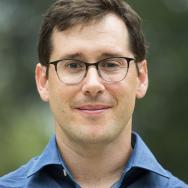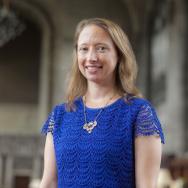More than two decades ago, Rebecca Sandefur stepped onto the UChicago campus for the first time as a graduate student, drawn by what she saw as a unique challenge.
Even on her school visit, she had sensed the University’s culture of serious intellectual inquiry, one she likened to “a rigorous, bare-knuckle brawl about ideas.” It felt like the perfect place for her to become a sociologist.
Although Sandefur, AM’97, PhD’01, hoped to study inequality in children’s schooling, a chance call from a UChicago professor turned her focus to the legal system. That switch eventually made her an expert on low-income access to civil justice—work that reentered the spotlight on Oct. 4, when she was one of 25 people awarded a prestigious MacArthur fellowship.
Once the shock of winning wore off, she started thinking about what the honor meant for her research.
“It’s been off the radar for 40 or 50 years,” said Sandefur, now an associate professor of sociology and law at the University of Illinois at Urbana-Champaign. “This is an opportunity to bring the focus back.”
UChicago sociologist Edward Laumann was the scholar who helped re-direct Sandefur’s research, bringing her on as a research assistant and supervising her dissertation, which analyzed the social organization of legal careers. Laumann, the George Herbert Mead Distinguished Service Professor of Sociology and the College, remembered Sandefur as “a very sophisticated researcher and a sharp colleague, and a pleasure to work with.”
“It was a springboard,” Sandefur said of her dissertation. “I went from studying lawyers’ careers to studying lawyers as a tool for people to access their rights. It quickly became clear that they are part of a much larger project.”
More than 50 people affiliated with the University have won MacArthur fellowships, most recently social justice activist Rami Nashashibi, AM’98, PhD’11 in 2017.
Access to civil justice
In selecting Sandefur, the MacArthur Foundation cited her creation of the first national map of civil legal aid providers. Published in 2011, the report collected data to create a state-by-state portrait of civil legal services. Five years later, she co-authored another study that examined the success of New York City Court Navigators, a pilot program that paired trained staffers to assist and advise litigants in housing and civil courts.
The reliance on lawyers, Sandefur said, stands in contrast to how public education functions. Few would expect parents who enroll their children in public schools to hire private consultants to navigate bureaucratic hurdles or accompany students to class.
Sandefur’s research quantified the ways in which trained non-lawyers can ensure just outcomes in civil cases, in which litigants are not guaranteed legal representation. Trained staffers can be particularly valuable to those who can’t afford traditional lawyers, or who might not even see problems with landlords or employers as ones necessitating legal remedies.
Access to civil justice was a more widely recognized problem during the 1960s and 1970s, Sandefur said, but faded from the national consciousness along with the War on Poverty.
The 47-year-old sociologist now hopes to use her MacArthur grant money—$625,000 dispensed over five years—to provide seed funding for ambitious initiatives. She pointed out that the New York City Court Navigators had a 100 percent success rate in its first year, saving roughly 150 people from eviction with the equivalent of just three full-time staffers. Illinois and Colorado also have launched similar programs.
However, no one has tested how similar work might fare at a larger scale.
“We’ve had 25 years of really cool pilot projects, but we haven’t had any of these major innovations go to scale,” Sandefur said. “Is there a way that we can do that? How much does it actually cost? How much would it save?
“It’s the next activity that would organize the field, but it’s also the next step in understanding how to solve this problem.”

